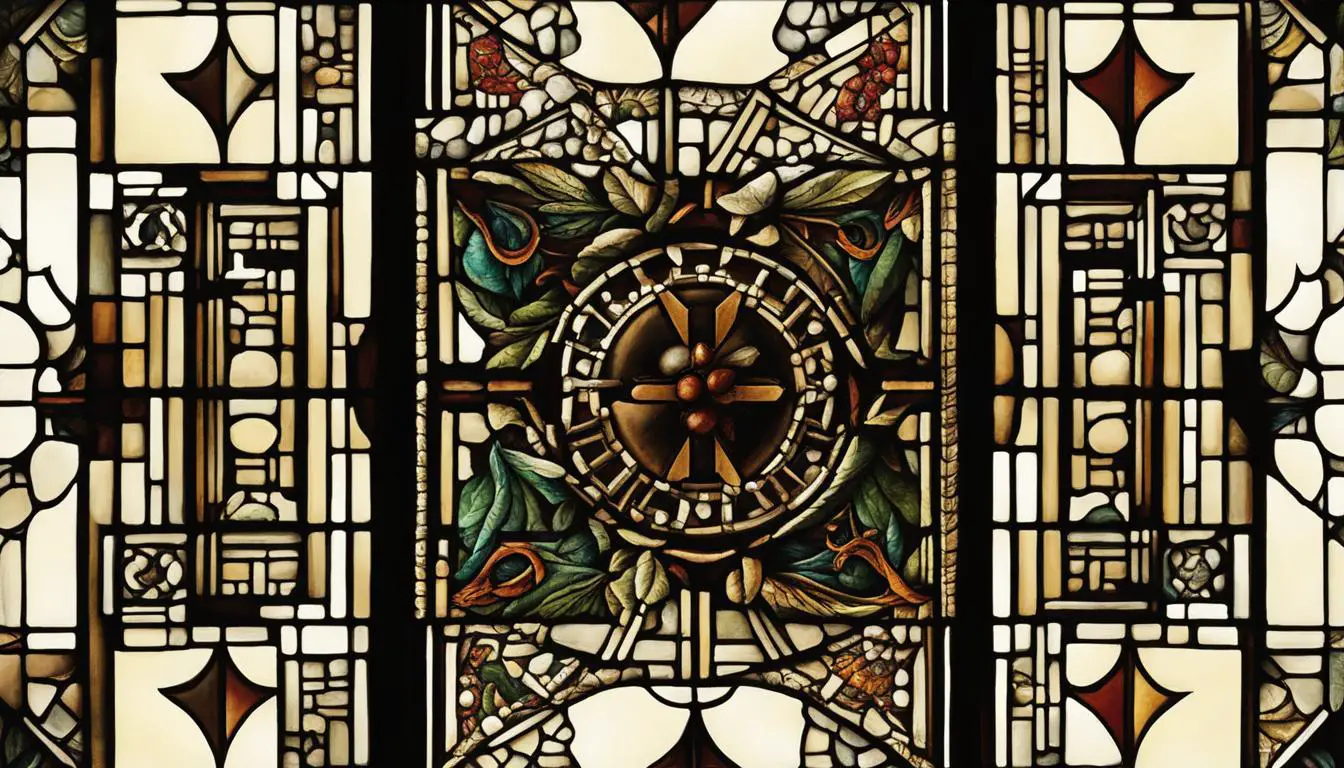When it comes to the concept of hell, the Bible presents a complex and nuanced understanding that goes beyond the traditional notions of eternal conscious torment. In this deep dive, we will explore the various biblical interpretations of hell and shed light on what the Bible actually says about this controversial topic.
The word “hell” may not even be found in most biblical translations, raising questions about its significance and interpretation. However, the Bible does use four distinct words that are translated as “hell”: Sheol (Hebrew), Hades (Greek), Tartarus (Greek), and Gehenna (Greek). Each of these words has different meanings and contexts, shedding light on the multifaceted nature of hell.
While Sheol and Hades refer to the abode of the dead, Tartarus is specifically associated with the imprisonment of fallen angels. Gehenna, on the other hand, is the most commonly mentioned word related to hell in the Bible and is often associated with punishment and destruction.
Join us as we delve into the meaning and implications of these biblical concepts of hell, exploring their origins, biblical verses, and the interpretations of scholars throughout history. We will also examine how the concept of hell relates to our modern understanding of right and wrong, and its relevance in today’s world.
Key Takeaways:
- The word “hell” is not found in most biblical translations, but the Bible does use four distinct words to refer to the concept of hell.
- Sheol and Hades represent the abode of the dead, while Tartarus is associated with fallen angels.
- Gehenna is the most commonly mentioned word related to hell and is often associated with punishment and destruction.
- The concept of hell has different interpretations among scholars, and its relevance in today’s world is a subject of ongoing discussion.
- Understanding the biblical concept of hell goes beyond the traditional notions of eternal conscious torment.
The Word “Hell” Isn’t Even Found In The Bible
When discussing the concept of hell in the Bible, it is important to note that the word “hell” itself is not actually found in most biblical translations. While the King James Bible contains the most mentions of “hell” at 54 occurrences, more accurate translations like NASB and NIV only have 13-14 mentions. This raises questions about the significance and interpretation of the concept of hell according to the Bible.
Instead of using the term “hell,” the biblical texts employ different words with distinct meanings and contexts. Four words, in particular, are translated as “hell”: Sheol (Hebrew), Hades (Greek), Tartarus (Greek), and Gehenna (Greek). Each of these words carries its own connotations and contributes to the religious understanding of hell in the Bible.
It is worth noting that the absence of the exact word “hell” in the Bible does not diminish the importance of exploring the biblical references to hell. Understanding the nuances of the different words used can shed light on the biblical concept of punishment, the afterlife, and the consequences of unrighteousness.

Etmology of Hell
| English | Hebrew | Greek | Bible Verses |
|---|---|---|---|
| Hell | — | — | — |
| Hades | — | ᾅδης (Haides) | Matthew 11:23; Luke 16:23; Acts 2:27 |
| Sheol | שְׁאוֹל (She’ol) | — | Genesis 37:35; Psalms 16:10; Isaiah 5:14 |
| Tartarus | — | ταρταρόω (Tartaroo) | 2 Peter 2:4 |
| Gehenna | — | γέεννα (Geenna) | Matthew 5:22; Mark 9:43; James 3:6 |
While the concept of hell is one that has been widely discussed and debated, it is important to recognize that the exact word “hell” is not found in most translations of the Bible. The biblical texts use different words with nuanced meanings to convey the concept of punishment, the afterlife, and the consequences of unrighteousness. By exploring these various words and their contexts, we can gain a deeper understanding of the religious understanding of hell in the Bible.
The Four Distinct Words Translated As “Hell”
In the biblical texts, the concept of hell is represented by four distinct words: Sheol (Hebrew), Hades (Greek), Tartarus (Greek), and Gehenna (Greek). Each of these words carries its own unique meaning and context, contributing to the overall understanding of hell in Christianity.
Sheol and Hades both refer to the abode of the dead. In Hebrew, Sheol is a general term that encompasses the grave and the world of the dead. Similarly, Hades in Greek represents the place where departed spirits reside. Both words denote a realm that includes both the righteous and the wicked after death, although there may be subtle differences in their connotations.
Tartarus, on the other hand, is a Greek word that specifically refers to the place where fallen angels are imprisoned. It signifies a location of divine punishment and is associated with the confinement of these supernatural beings.
Finally, Gehenna is the most commonly mentioned word related to hell in the Bible. It is often used by Jesus in his teachings, emphasizing the consequences of unrighteousness and sin. Gehenna is associated with punishment, torment, and destruction, and is frequently portrayed as a place of judgment for the wicked. It is also equated with the Lake of Fire mentioned in the book of Revelation, representing the final destination for those who reject God.
| Word | Meaning | Context |
|---|---|---|
| Sheol (Hebrew) | The abode of the dead | Includes the grave and the world of the dead |
| Hades (Greek) | The place of departed spirits | Residence for both the righteous and the wicked after death |
| Tartarus (Greek) | The place where fallen angels are imprisoned | Imprisonment and divine punishment for supernatural beings |
| Gehenna (Greek) | Place of punishment, torment, and destruction | Associated with judgment for the wicked and rejection of God |
These four words provide a comprehensive scriptural view of hell within Christianity, offering different perspectives on the consequences of unrighteousness and the ultimate destination for those who reject God’s teachings. Understanding these concepts can deepen our appreciation for the complexities surrounding the biblical concept of hell.
The Meaning of Sheol and Hades
When examining the biblical concept of hell, it is essential to understand the meanings behind Hebrew and Greek terms such as Sheol and Hades. In Hebrew, Sheol refers to the pit, abyss, or the world beneath the surface. It encompasses both the grave and the realm of the dead, signifying the abode of both the righteous and the wicked after death. Similarly, Hades, the Greek equivalent, represents the place of departed spirits and shares these same connotations.
Both Sheol and Hades carry nuances in their meanings. While they often refer to the physical realm of death and burial, there are indications that they also represent a place of punishment and suffering, especially for the wicked. These terms highlight the dual nature of the afterlife—a realm that encompasses both physical death and the spiritual consequences of sin.
Throughout the Bible, various verses shed light on the understanding of Sheol and Hades. For instance, Psalm 139:8 (NIV) states, “If I go up to the heavens, you are there; if I make my bed in the depths, you are there.” This verse emphasizes that God’s presence extends even to the depths of Sheol. In Matthew 16:18 (NASB), Jesus declares, “I also say to you that you are Peter, and upon this rock I will build My church; and the gates of Hades will not overpower it.” This passage suggests that even the power of Hades cannot prevail against the Church, highlighting God’s sovereignty and protection.
While Sheol and Hades are distinct concepts in Hebrew and Greek, their meanings intertwine in their depiction of the afterlife. These terms invite reflection on mortality, the consequences of our choices, and our need for salvation.
| Sheol (Hebrew) | Hades (Greek) |
|---|---|
| Refers to the pit, abyss, or the world beneath the surface | Represents the place of departed spirits |
| Encompasses the grave and the realm of the dead | Shares the same connotations as Sheol |
| Signifies the abode of both the righteous and the wicked after death | Indicates the dwelling place for the spirits of the deceased |
| Implies punishment and suffering for the wicked | Reflects both physical death and spiritual consequences of sin |
Exploring Gehenna as a Place of Punishment
Gehenna is a significant concept in the Bible when it comes to understanding the idea of punishment and destruction. This term is mentioned in the teachings of Jesus and often associated with the consequences of unrighteousness. The biblical interpretation of Gehenna paints a vivid picture of a place characterized by torment and fiery punishment.
One biblical reference to Gehenna is found in Mark 9:43-48, where Jesus warns of the severe consequences of sin. He describes Gehenna as a place where “their worm does not die and the fire is not quenched.” This imagery emphasizes the eternal nature of punishment in Gehenna and serves as a powerful warning against unrighteousness.
“And do not fear those who kill the body but cannot kill the soul. Rather fear him who can destroy both soul and body in Gehenna.” – Matthew 10:28
Another reference to Gehenna can be found in the book of Revelation, where it is equated with the Lake of Fire. The Lake of Fire is described as the final place of torment for the wicked, where they will experience eternal separation from God. This portrayal of Gehenna as the ultimate destination for the ungodly underscores the seriousness of sin and its consequences.
| Gehenna in the Bible | References |
|---|---|
| Gehenna as a place of punishment | Mark 9:43-48 |
| Gehenna as the Lake of Fire | Revelation 20:14-15 |
It’s important to note that while Gehenna is depicted as a place of punishment, the Bible does not provide a detailed map or description of its physical location. Instead, the focus is on the consequences of unrighteousness and the need to turn to God, who offers forgiveness and eternal life through Jesus Christ.
In summary, Gehenna is a biblical concept associated with punishment and destruction. Jesus used Gehenna as a warning against unrighteousness, emphasizing the eternal nature of its consequences. Whether viewed as a place of torment or equated with the Lake of Fire, Gehenna represents the ultimate fate for the ungodly. The exact nature and physical existence of Gehenna remain mysterious, but its significance as a symbol of divine judgment is clear.
The Concept of Sheol as a Grave or Death
In the Bible, Sheol is often associated with the concept of death and the grave. It represents the physical realm of the dead and is closely linked to burial practices. The term Sheol is used in both the Hebrew and Greek texts to describe the abode of both the righteous and the wicked after death. It signifies not only the physical state of being deceased but also the spiritual consequences of one’s actions.
Throughout the Scriptures, there are instances where Sheol is depicted as a place of punishment and suffering, particularly for the wicked. It is a reminder that the consequences of unrighteousness extend beyond physical death. However, it is important to note that Sheol does not solely represent a place of punishment. It encompasses the full range of experiences associated with death, including the resting place of the righteous and the wicked alike.
In the Old Testament, there are references to Sheol in various passages. For example, in Psalm 139:8, David acknowledges that even if he were to make his bed in Sheol, God would still be present. This suggests that Sheol is not a place devoid of God’s presence but rather a state or condition that all humanity will ultimately face.
| Definition | Hebrew | Greek |
|---|---|---|
| Meaning | Sheol | Hades |
| Realm of the Dead | A general term for the parts of the world beneath the surface, including the grave and the world of the dead. | Corresponds to Sheol and is also the place of departed spirits. |
| Righteous and Wicked | Both the righteous and the wicked are said to reside in Sheol. | Similar to Sheol, Hades is the abode of the departed, encompassing both the righteous and the unrighteous. |
| Consequences for Sin | Sheol represents not only physical death but also the spiritual consequences of sin. | Hades is associated with punishment and suffering, indicating the consequences of unrighteousness. |
Overall, the concept of Sheol provides a nuanced understanding of death and its implications. It serves as a reminder that our actions in this life have eternal significance, both in terms of the physical outcome and the spiritual consequences. While the full nature of Sheol remains a topic of interpretation and discussion, it underscores the importance of living a righteous life and seeking a relationship with God.
Understanding the Abyss and Tartarus
When exploring the concept of hell in biblical texts, two distinct terms arise: the Abyss and Tartarus. The Abyss is mentioned as the abode of demonic forces and curses, while Tartarus specifically refers to the imprisonment of fallen angels. These terms carry a sense of restriction and torment, although their exact nature and purpose are not fully defined.
The Abyss, often associated with chaos and darkness, represents a place of confinement and punishment for demonic entities. It is portrayed as a realm of spiritual darkness, where malevolent forces are restrained. While the Bible does not provide extensive details about the Abyss, it signifies the state of separation from God’s presence and the consequences of evil.
“And he said to them, ‘I saw Satan fall like lightning from heaven.’” – Luke 10:18
On the other hand, Tartarus is specifically mentioned in 2 Peter 2:4 as the realm where fallen angels are held captive. It refers to a place of divine judgment and serves as a reminder of the consequences of rebellion against God. This term emphasizes the idea that even supernatural beings are subject to punishment and the divine order.
While the Abyss and Tartarus are distinct concepts within the Bible, they both highlight the repercussions of disobedience and rebellion against God’s divine authority. These terms serve as reminders of the consequences faced by those who reject God’s will and choose to follow their own destructive paths.
The Abyss and Tartarus: A Closer Look
| Abyss | Tartarus | |
|---|---|---|
| Meaning | A place of confinement for demonic forces | The imprisonment of fallen angels |
| Associated with | Chaos, darkness, and spiritual darkness | Divine judgment and consequences of rebellion |
| Relevance | Highlighting the consequences of evil and separation from God | Emphasizing divine order and punishment for supernatural beings |
While the precise nature of the Abyss and Tartarus may be shrouded in mystery, their presence in the Bible signifies the importance of obedience and the consequences of defying God’s authority. These concepts serve as reminders that even supernatural beings are subject to judgment and that the spiritual realm encompasses realms of confinement and torment.
The Millennium and Outer Darkness
The concept of the Millennium refers to the current age in biblical theology. It represents the time between the first and second advents of Christ. During this period, believers are called to live in righteousness and obedience to God’s commandments, eagerly awaiting the return of Jesus and the establishment of His eternal kingdom. The Millennium is a time of hope and anticipation for the fulfillment of God’s promises.
“Then I saw thrones, and seated upon them were those to whom the authority to judge was committed. Also, I saw the souls of those who had been beheaded for the testimony of Jesus and for the word of God, and those who had not worshiped the beast or its image and had not received its mark on their foreheads or their hands. They came to life and reigned with Christ for a thousand years.”
Revelation 20:4 (ESV)
Outer darkness, on the other hand, is a term used in the New Testament to describe a place of punishment and exclusion. It is often associated with Gehenna, which represents the final place of torment for the wicked. Outer darkness signifies a state of separation from God’s blessings and the presence of His light. It serves as a solemn reminder of the consequences of unrighteousness and the rejection of God’s grace.
While the exact nature and duration of punishment in outer darkness are not explicitly defined in the Scriptures, it underscores the seriousness of sin and the need for repentance. The concept of outer darkness serves as a sobering reminder that our choices and actions in this life have eternal ramifications. It calls us to seek righteousness and to turn towards God’s love and mercy.
The Millennium and Outer Darkness Summary:
- The Millennium refers to the current age between the first and second advents of Christ.
- Believers are called to live in righteousness and anticipation of Jesus’ return.
- Outer darkness represents a place of punishment and exclusion.
- It is associated with Gehenna, the final place of torment for the wicked.
- Outer darkness emphasizes the consequences of unrighteousness and the need for repentance.
| Concept | Description |
|---|---|
| The Millennium | Refers to the current age between the first and second advents of Christ. |
| Outer Darkness | Represents a place of punishment and exclusion. |
| Associated with | Gehenna, the final place of torment for the wicked. |
| Emphasizes | The consequences of unrighteousness and the need for repentance. |
Conclusion
The biblical understanding of hell encompasses a range of terminology, imagery, and theological interpretations. While the Bible mentions punishment, torment, and destruction in relation to hell, it does not provide explicit details about its exact nature or duration. Instead, the focus of the Bible is to bring good news, guide individuals towards righteousness, and highlight the significance of cultivating a relationship with God.
Various words in the Bible, such as Sheol, Hades, Gehenna, and Tartarus, are translated as “hell,” but they carry distinct meanings and contexts. Sheol and Hades refer to the abode of the dead, while Gehenna is often associated with punishment and destruction. Tartarus, on the other hand, pertains to the imprisonment of fallen angels.
It is worth noting that the concept of hell in the Bible is subject to differing viewpoints and interpretations among theologians and scholars. Some argue for the idea of eternal punishment, while others propose alternative understandings of hell based on historical, cultural, and scriptural analysis.
Ultimately, the biblical understanding of hell underscores the consequences of unrighteousness and the potential separation from God. However, the precise details and implications of these consequences remain topics of ongoing theological exploration and discussion.
FAQ
Is the concept of hell found in the Bible?
The word “hell” is not actually found in most biblical translations. While there are references to punishment, torment, and destruction, the exact nature and duration of hell are not explicitly defined in the Scriptures.
How many times is the word “hell” mentioned in the Bible?
The King James Bible contains the most mentions of “hell” at 54 occurrences, while more accurate translations like NASB and NIV only have 13-14 mentions.
What are the four distinct words translated as “hell” in the Bible?
The four words are Sheol (Hebrew), Hades (Greek), Tartarus (Greek), and Gehenna (Greek).
What do Sheol and Hades refer to?
Sheol and Hades refer to the abode of the dead, including the grave and the world of the dead. Both terms signify the abode of both the righteous and the wicked after death.
What is Gehenna?
Gehenna is a place of punishment, torment, and destruction in the Bible. It is often associated with punishment after death and is equated with the Lake of Fire mentioned in the book of Revelation.
Does Sheol represent the grave or something more?
Sheol is used to refer to the grave or death itself, but there are indications that it also represents a place of punishment and suffering, particularly for the wicked.
What are the Abyss and Tartarus?
The Abyss is mentioned as the abode of demonic forces and curses in the Bible, while Tartarus is specifically associated with the imprisonment of fallen angels.
What is the significance of the Millennium and outer darkness?
The Millennium represents the current age between the first and second advents of Christ, while outer darkness is a place of cursing and separation from the blessings of God.
What is the biblical understanding of hell?
The Bible presents varied terminology and imagery when it comes to the concept of hell. While there are references to punishment, torment, and destruction, the exact nature and duration of hell are not explicitly defined in the Scriptures. The main focus of the Bible is to bring good news, guide people towards righteousness, and emphasize the importance of a relationship with God.









Leave a Reply